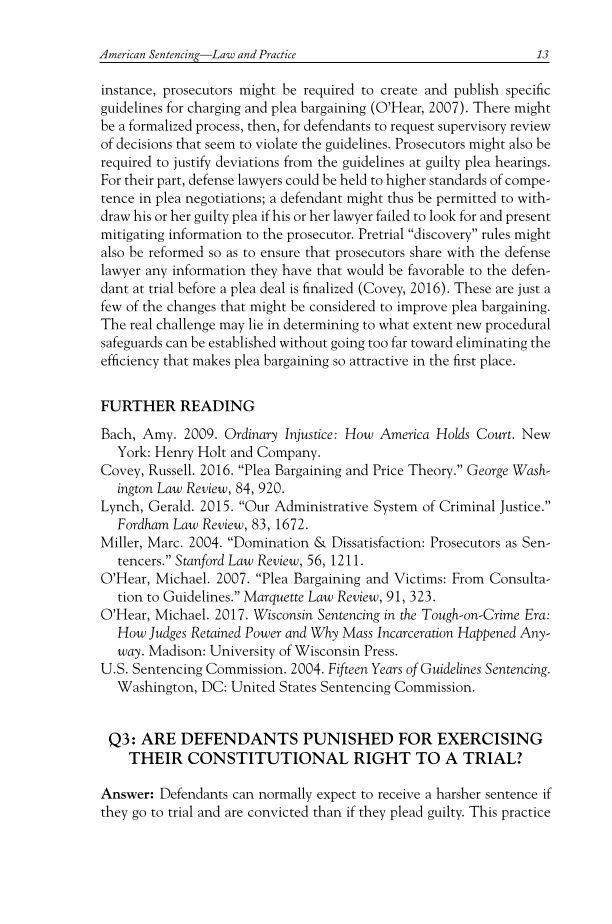American Sentencing—Law and Practice 13 instance, prosecutors might be required to create and publish specifi c guidelines for charging and plea bargaining (O’Hear, 2007). There might be a formalized process, then, for defendants to request supervisory review of decisions that seem to violate the guidelines. Prosecutors might also be required to justify deviations from the guidelines at guilty plea hearings. For their part, defense lawyers could be held to higher standards of compe- tence in plea negotiations a defendant might thus be permitted to with- draw his or her guilty plea if his or her lawyer failed to look for and present mitigating information to the prosecutor. Pretrial “discovery” rules might also be reformed so as to ensure that prosecutors share with the defense lawyer any information they have that would be favorable to the defen- dant at trial before a plea deal is fi nalized (Covey, 2016). These are just a few of the changes that might be considered to improve plea bargaining. The real challenge may lie in determining to what extent new procedural safeguards can be established without going too far toward eliminating the effi ciency that makes plea bargaining so attractive in the fi rst place. FURTHER READING Bach, Amy. 2009. Ordinary Injustice: How America Holds Court . New York: Henry Holt and Company. Covey, Russell. 2016. “Plea Bargaining and Price Theory.” George Wash- ington Law Review , 84, 920. Lynch, Gerald. 2015. “Our Administrative System of Criminal Justice.” Fordham Law Review , 83, 1672. Miller, Marc. 2004. “Domination & Dissatisfaction: Prosecutors as Sen- tencers.” Stanford Law Review , 56, 1211. O’Hear, Michael. 2007. “Plea Bargaining and Victims: From Consulta- tion to Guidelines.” Marquette Law Review , 91, 323. O’Hear, Michael. 2017. Wisconsin Sentencing in the Tough-on-Crime Era: How Judges Retained Power and Why Mass Incarceration Happened Any- way . Madison: University of Wisconsin Press. U.S. Sentencing Commission. 2004. Fifteen Years of Guidelines Sentencing . Washington, DC: United States Sentencing Commission. Q3: ARE DEFENDANTS PUNISHED FOR EXERCISING THEIR CONSTITUTIONAL RIGHT TO A TRIAL? Answer: Defendants can normally expect to receive a harsher sentence if they go to trial and are convicted than if they plead guilty. This practice
Document Details My Account Print multiple pages
Print
You have printed 0 times in the last 24 hours.
Your print count will reset on at .
You may print 0 more time(s) before then.
You may print a maximum of 0 pages at a time.






























































































































































































































































